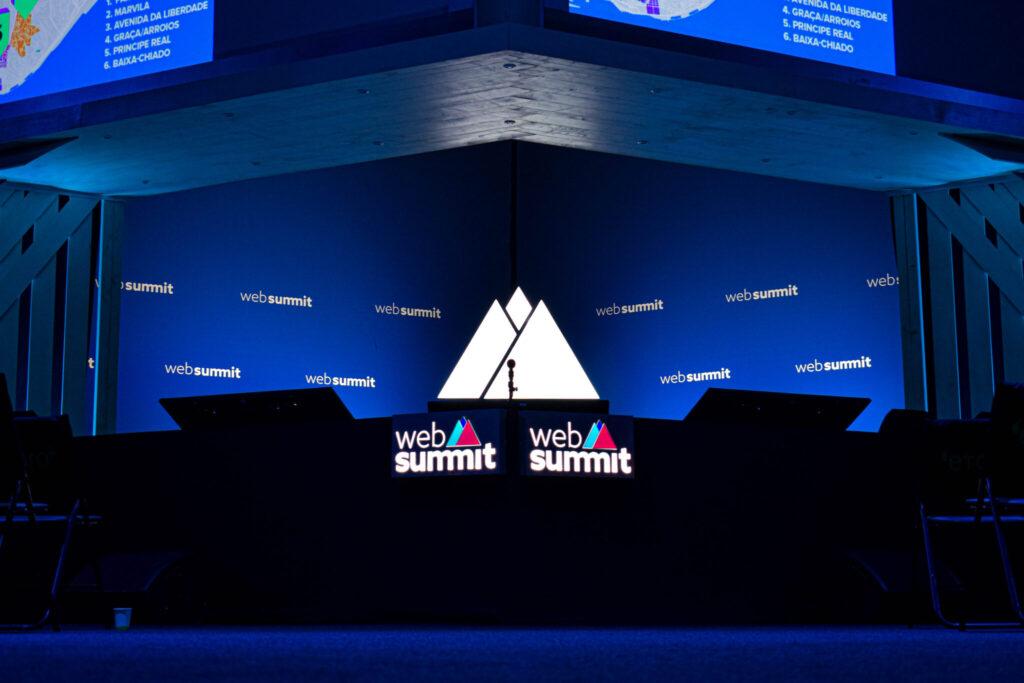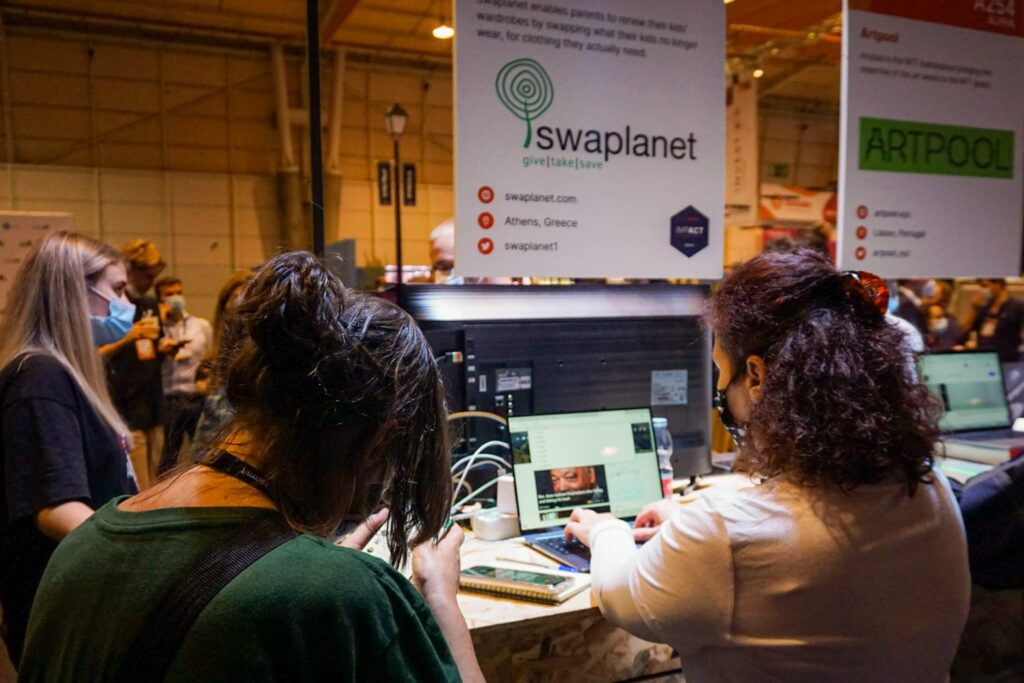Na Web Summit, os participantes podem aprofundar esta questão para compreender, em primeira mão, o que está a ser criado em todo o mundo para assegurar que a ação climática e a inovação andem de mãos dadas, para alcançar um futuro melhor e promissor.

Na Web Summit, os fundadores de diversas startups têm a oportunidade de participar em diferentes palcos para divulgar os seus projectos, atrair investidores e clientes.
A Comissão Europeia, um dos parceiros da Web Summit, foi representada pelo seu próprio projecto #NextGenerationEU. Ele surgiu como um instrumento de mitigação dos impactos económicos e sociais da pandemia nas economias europeias e visava fornecer uma fonte de encorajamento e resiliência num “crescimento sustentável a longo prazo” pós-pandémico. Isto poderia ser conseguido “respondendo aos desafios da transição para uma sociedade mais verde e mais digital”. Este é o objectivo do mecanismo do Plano de Recuperação e Resiliência (PRR), que inclui um investimento atribuído de cerca de 3,059 milhões de euros (um valor estimado de trinta e oito por cento do orçamento final) para Projectos de Alterações Climáticas.
Com esta mentalidade ambientalmente consciente, a Reflora e a Ecotree desenvolveram projectos para combater as alterações climáticas através da reflorestação. Se o primeiro promove uma ponte entre empresas e projectos de reflorestação, principalmente na floresta tropical amazónica, para alcançar a neutralidade de carbono; do outro lado do Oceano Atlântico, a Ecotree pretende atrair investimentos globais para a plantação e gestão florestal, em França e na Dinamarca. Ambos resultam na protecção da biodiversidade, das espécies nativas e dos recursos florestais.

Espalhados pelos 4 pavilhões, os startups exibiram os seus projectos, na esperança de atrair investidores, clientes e divulgar o seu trabalho.
Na “terra da inovação”, como muitas vezes é descrita a Web Summit, é fácil saltar para os fundadores das mais diversas startups. De todas as idades, a sua inspiração vem dos antecedentes da sua família, da investigação escolar ou de um único quadro visto nas redes sociais. Este é exactamente o caso de Nhat Vuong, co-fundador de The Happy Turtle Straw. Depois de verem o famoso vídeo de uma palha a ser retirada do nariz de uma tartaruga, estes empresários sabiam que tinham de mudar esta realidade. Foi assim que uma palha completamente comestível, feita de batatas, tapioca e arroz, surgiu. Com especial atenção para a justiça social por detrás da produção destas palhas, os ingredientes provêm de produtos prejudicados pelo processo de colheita, que teriam de ser desperdiçados se não fossem utilizados por esta empresa. Da mesma forma, Biocosmos, uma linha de tratamento de pele produzida a partir de uvas, começou a recolher resíduos de produtores de vinho em Portugal rural.
Estes são alguns dos poucos exemplos encontrados na Web Summit 2021, que não só trabalham para os objectivos da Transição Climática do RRP, mas também criam formas inovadoras de utilização de produtos que, caso contrário, teriam sido desperdiçados. Este evento prova, portanto, que é possível abordar os ODS aparentemente tão diferentes como o Trabalho Decente e o Crescimento Económico e a Ação Climática, com um único projecto.
1 – em “What is Web Summit”, em www.websummit.com.
————————————————————————————————————————————————————————————————————————
Where to next? The place where technological innovation and climate action meet.
“At a time of great uncertainty for many industries and, indeed, the world itself, we gather the founders and CEOs of technology companies, fast-growing startups, policymakers, and heads of state to ask a simple question: Where to next?”1. In the words of Carlos Moedas, mayor of Lisbon, the host city to Web Summit since 2016, the answer is simple: “you, young people, newest entrepreneurs and big CEOs of the future, have to be responsible for setting up a responsible company, that is your job.”.
In Web Summit, attendees can go deeper into this question to understand, first hand, what is being created all over the world to ensure that climate action and innovation go hand in hand, to achieve a promising better future.

In Web Summit founders of diverse startups have the chance to pitch in different stages to spread their projects, attract investors and clients.
The Europe Commission, one of the Web Summit partners, was represented by their very own project #NextGenerationEU. It rose as a tool of mitigation of the economic and social impacts of the pandemic in the European economies and aimed to provide a source of encouragement and resilience in a “long-term sustainable growth” post-pandemic. This could be achieved while “meeting the challenges of the transition to a greener and more digital society”. This is the goal of the Recovery and Resilience Plan (RRP) mechanism, which includes an allocated investment of around 3.059 million euros (an estimated thirty-eight per cent of the final budget) for Climate Change Projects.
With this environmentally conscious mindset, Reflora and Ecotree developed projects to fight climate change through reforestation. If the first one promotes a bridge between companies and reforestation projects, mainly in Amazon Rainforest, to achieve carbon neutrality; on the other side of the Atlantic Ocean, Ecotree aims to attract global investments into forests plantation and forest management, in France and Denmark. Both of them result in the protection of biodiversity, native species and forest resources.

Spread across the 4 pavilions, startups exhibited their projects, in the hope you attracting investors, clients and spreading the word about their work.
In “the land of innovation”, as often Web Summit is described, it is easy to jump into founders of the most diverse startups. From all ages, their inspiration comes from their family’s background, school research or from a single picture seen on social media. This is exactly the case of Nhat Vuong, co-founder of The Happy Turtle Straw. After watching the famous video of a straw being removed from a turtle’s nose, these entrepreneurs knew they had to change this reality. That’s how a completely edible straw, made of potatoes, tapioca and rice came up. With special attention to the social justice behind the production of these straws, the ingredients come from harmed by the harvest process goods, which would have to be wasted if not used by this company. Similarly, Biocosmos, a skincare line produced from grapes, started to collect residues from wine producers in rural Portugal.
These are some of the few examples found at Web Summit 2021, startups which not only work towards the RRP Climate Transition goals but also create innovative ways of using products that, otherwise would have been wasted. Web Summit proves, therefore, that it is possible to tackle SDGs apparently as different as Decent Work and Economic Growth and Climate Action, with a single project.
1 – in “What is Web Summit”, at www.websummit.com.




You must be logged in to post a comment.